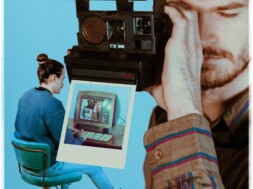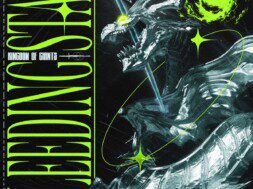
ALBUM: Panic! at the Disco – ‘Death of a Bachelor’
Las Vegas, Nevada. One of America’s great havens of excitement, excess and entertainment, it’s become fertile ground for modern rock bands with The Killers, Five Finger Death Punch and Imagine Dragons all hailing from the city. Perhaps best characterising it was the carnival madness of Panic! at the Disco, who emerged in 2005 with all the subtlety of a neon pink elephant and nearly as much imagination as the sum of the scores of “emo” bands they were bewilderingly lumped in with it. A Fever You Can’t Sweat Out, one of the last decade’s most notable debuts, threw baroque, techno and swing influences into a volatile formula that proved too explosive to last more than one album, and from the Beatles whimsy of Pretty. Odd. to Too Weird to Live, Too Rare to Die! and its contemporary party pop, Panic! have been a difficult animal to understand. After losing half its members and then being rebuilt, the band is now essentially a solo vehicle for vocalist Brendon Urie, and this time around he’s holding nothing back in delivering music bigger and more ludicrous than anything preluding it.
The vibrant colours that illuminate Death of a Bachelor’s artwork are a perfect visual representation of the candy cane chaos of the songs that lie inside. Throwing in the kitchen sink is simply not enough this time around – the soundscapes are packed to the brim with vivacious choral backing, parping brass sections and miscellaneous electronic noises in order to convey the message that this is Panic! writ larger than ever. Over the first half of the record in particular it’s difficult to decipher the subtleties of the songwriting over the booming cannon fire drums and nonsensical sound effects. Beyond “Don’t Threaten Me With a Good Time” and its B-52s sample there’s little in the way of memorable riffs or instrumental hooks, these sacrificed at the twin altars of pop songcraft and wall of noise production. There seems to be a million Brendon Uries on each track, and his multi-layered vocals uniformly soar but also grate on the annoying repetitions in the chorus of “Emperor’s New Clothes” – he’s a great talent, and his voice just doesn’t need so much tampering with.
As an opening gambit, “Victorious” is a tad misleading, as its charging Queen-laced disco never crops up again. Instead we twice get an inflated, 21st century take on Sinatra jazz that works better on the dynamic title track than “Impossible Year”, an elegant if a little too on-the-nose pastiche. They do at least show a restraint of arrangement that’s bereft on much of Death of a Bachelor, aside from the twin highlights buried towards its end. “Golden Days” succeeds largely on the strength of its chorus, on which Urie’s voice is given the space it needs to truly boom out a magnificent arena rock melody, and it’s followed in fleet-footed fashion by the highway glitz of “The Good, The Bad and The Dirty”. These highlights work infinitely better than the bulk of the record because of what’s not been stuffed into them, and because the songwriting that over the entirety of it is excellent is actually given a chance to flourish, rather than being crushed under the weight of pomp and circumstance.
That’s the legacy of Death of a Bachelor, a gleaming, weighed-down mountain of bells and whistles with a cluster of brilliant songs, only a few of which are as good as they could have been with a little more quality control in their arrangements. Gifted with a little more of the tact shown on 2011’s Vices and Virtues and someone over Brendon Urie’s shoulder to tell him when to stop, this could have been the group’s defining album. Enjoying it is far from difficult, but trying to penetrate its overwhelming sound and connect to the beating heart within it is a challenge that may not be worth the trouble. Revel, then, in the bittersweet pop genius, and try not to let your senses be overwhelmed by the slot machine madness of what underpins it.




























